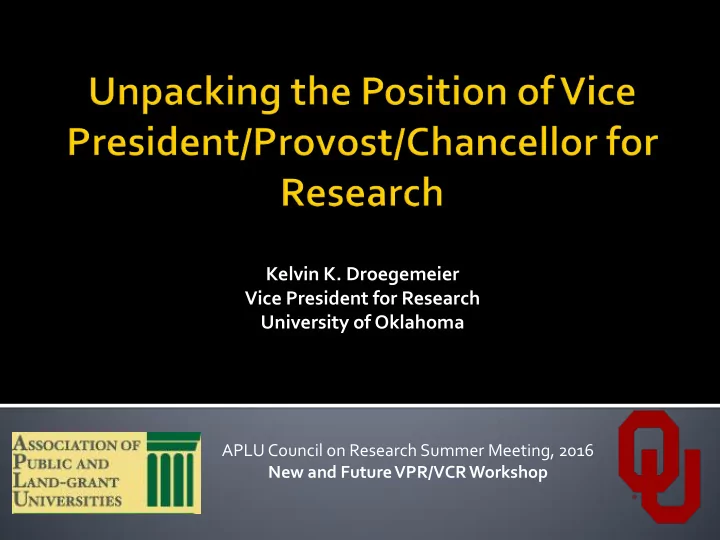

Kelvin K. Droegemeier Vice President for Research University of Oklahoma APLU Council on Research Summer Meeting, 2016 New and Future VPR/VCR Workshop
Drs. Lori A. Snyder and Alicia Knoedler, University of Oklahoma Dr. Carolyn Whitacre, The Ohio State University Brett Litwiller and William Taylor, University of Oklahoma Dr. Howard Gobstein, Christine Keller, Teri Lyn Hinds, Kacy Redd, and Nathalie Argueta, APLU
The Vice President/Vice Chancellor/Vice Provost for Research (hereafter VPR) is A key (though perhaps not well understood) position in public and private research universities Structured and deployed in a wide variety of ways with a wide variety of responsibilities Facing many new challenges owing to problematic budgets, compliance requirements, and dramatic changes in the higher education landscape
No comprehensive survey had been conducted of VPRs/VCRs to understand Administrative structures utilized and their strengths and weaknesses Characteristics and experiences of individuals holding the position Current roles and responsibilities of the position New and emerging challenges , and skills needed to meet them Strategies for effectively preparing the next generation , including possible roles for CRPGE and other APLU organizations Article on survey results has been submitted to the peer reviewed Review of Higher Education
Your Institution (6) You (5) Your Professional Experience (8) The Structure of your Current Position (19) Training (5) Current State of the VPR/VCR Position (18) Succession Planning (3) Response rate = 50% Many more results and analyses than we have time to show today!!
84% from Research Universities 51% Very high research activity (Now Highest Research/R1) 33% High research activity 97% from public universities 41% from land grant universities
White Female Black or African American Male Asian Prefer not to Disclose Prefer not to Disclose
Discipline of Degree 40 yrs ago 30 yrs ago 25% Engineering 20 yrs ago 24% Biomedical and Biomedical Sciences Mean: 1983 Std. Dev.: 7 22% Physical Sciences N: 79 5% Social Sciences 10 yrs ago 5% Psychology 5% Agriculture and related sciences
President/Chancellor Vice President for Academic Affairs/Provost Vice Chancellor for Research Other Graduate Dean
Mean: 10.2 Median: 8 Std. Dev.: 10.0 N: 78 Number reporting directly to VPR
Institutional Review Board Sponsored programs, pre-award services Research development Inst. Animal Care & Use (IACUC) External Funding Research Center/Campus Patenting/licensing 76% 78% 80% 82% 84% 86% 88% 90% 92% 94% 96% 98%
34% have purview over Health Campus/Organization 24% have purview over Veterinary Medicine Campus/Organization 57% have responsibility for a 501(c)3 non- profit research organization
63% have budget linked to indirect cost recovery
57% have role in funding retention packages, relative to other offices Percentage funded by VPR
79% have a role in funding startup packages Percentage of start-up funded by VPR
Multidisciplinary Research External Funding from Federal Agencies Research Interactions with Private Sector Applied Research Development Undergraduate Participation in Research Research with Non-Profit Foundations Diversity of Fields of Research Diversity Among Faculty and/or Students Linking Research with Philanthropy Other 0% 10% 20% 30% 40% 50% 60% 70% 80% 90%100%
Director/Assistant Director Department Chair/Head Research Experience Service in Gov./Federal Organization Dean/Assoc. Dean Involvement with Sponsored Research Leadership Outside of Academia 0% 5% 10% 15% 20% 25% 30%
University Culture Developing Strategic Research Areas and/or Teams National Research Priorities Personnel Management How to Develop and/or Sustain Programs 0% 10% 20% 30% 40% 50% 60% 70% 80%
Leadership Ability to Influence Stakeholders (E.G., President, Fellow Deans, Trusts, Etc.) Ability to Gain Credibility in Eyes of Faculty Strategic Planning Critical Thinking 0% 10% 20% 30% 40% 50% 60% 70% 80% 90%
Decling Federal Budgets Insufficient Internal Funding Insufficient External Funding Too Many Activities for One Person Faculty Who are Insufficiently Bold and Unwilling to Take Risks Burdensome Federal Compliance Regulations 0% 10% 20% 30% 40% 50% 60% 70%
Helping Faculty Achieve Their Goals Building Infrastructure for Future Research Seeing Society Benefit through the University's Research Efforts Seeing Advances Made in the Scholarly Enterprise Helping Create Jobs 0% 20% 40% 60% 80% 100%
Economic Development Commercialization of University Research Export Controls Foundation Relations Philanthropy Private Industry Relations 0% 10% 20% 30% 40%
Funding Issues Economic Development Relationships with Industry Compliance Burden Research Collaboration Faculty Development 0% 10% 20% 30% 40% 50% 60% 70% 80%
External Relations/Communication Leadership/Management Skills Fostering Teamwork/Collaboration Working with Industry/Private Sector Strategic Planning Internal Relations (within University) 0% 5% 10% 15% 20% 25% 30% 35% 40%
More Staffing More Funding Involvement in Strategic Decisions Report to President More Institutional Focus on Research Changes in F&A distribution Increase Internal Support 0% 5% 10% 15% 20% 25% 30%
Research Administration Experience Other Admin. Experience Leadership/Mgmt./Comm. Training Experience in Office of VPR Management of Large Entities General Research Experience 0% 5% 10% 15% 20% 25%
VPR gender and ethnic diversity are notably low Few institutions have plans for UG research Institutions with strategic plans for research tend to fare better VPR duties, workload and future challenges suggest difficulty attracting the next generation of leaders VPR succession planning appears to not be a priority within institutions Considerable turnover (~50%) may occur in VPR positions during the next 1-3 years. Current VPRs appear to view their successors as having career paths similar to their own, perhaps leading to blindness to those in non-traditional pathways
For VPRs: Provide professional development for those who might wish to become VPRs For Aspiring VPRS: Speak with your VPR about your ambitions and her/his view of possible professional development activities Point your VPR to this survey and the journal article Seek to become a strategic player at your institution Read materials that are relevant to VPR activities Make yourself known to search firms
Recommend
More recommend